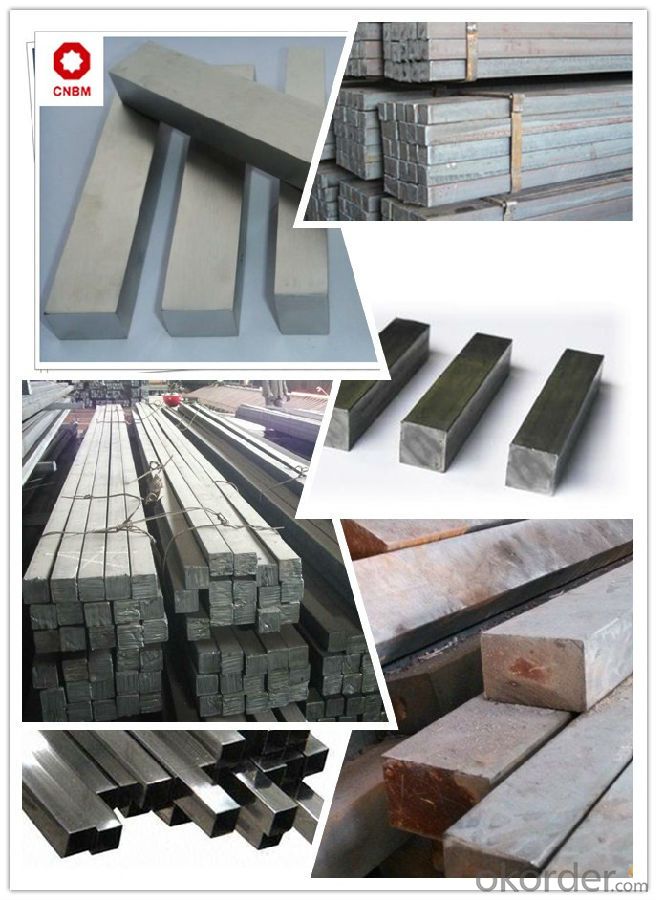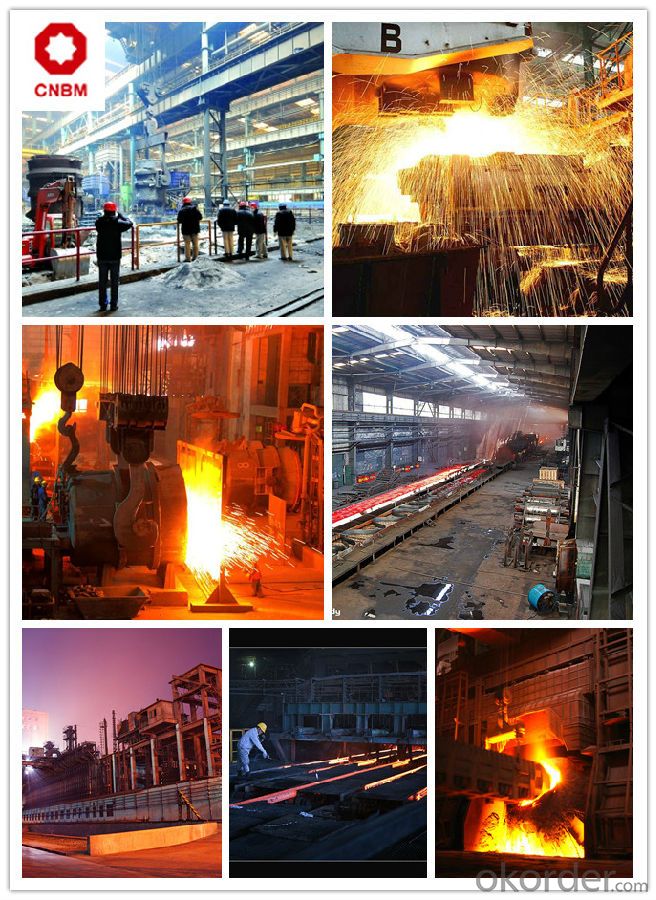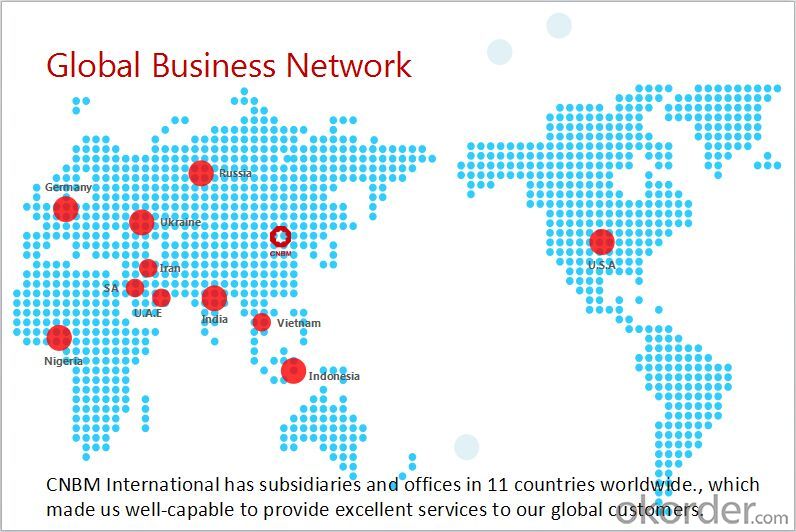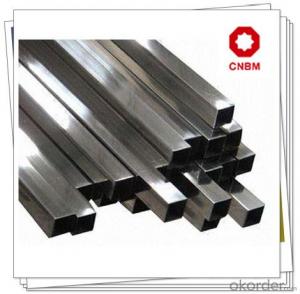Carbon Structural Steel Square Bars SS400CR
- Loading Port:
- Shanghai
- Payment Terms:
- TT OR LC
- Min Order Qty:
- 25 m.t.
- Supply Capability:
- 120000 m.t./month
OKorder Service Pledge
OKorder Financial Service
You Might Also Like
Carbon Structural Steel Square Bars SS400CR
Product Specification
1, p ≤0.050%; S ≤0.050%; Cr ≥0.30%
2, Strength of Extension σb ≥400 Mpa
Yield Strength σs ≥245(25) Mpa
Application
1, Widely used in construction and engineering structure.
2, Widely used in making reinforcing steel bar or building plant room rack, high voltage transmission tower, bridge, vehicle, boiler, vessel, ship, etc.
3, Widely used in manufacturing mechanical parts which do not require high performance.
4, SS400CR with grade C or D can be used as steel with special use.
Product Main Points
1, Heat Treatment: normalizing, annealing, tempering, quenching
2, Surface Treatment: black, bright, polished, galvanized
3, Product Process: hot rolled, cold drawn, forged
Product Show

Work Shop

About Us


- Q:Can steel round bars be used for making propeller shafts?
- It is indeed possible to utilize steel round bars in the production of propeller shafts. The utilization of steel in propeller shafts is widespread due to its robustness, endurance, and ability to withstand corrosion. In particular, round bars are frequently favored due to their shape, which offers exceptional strength and load-bearing capabilities. The decision regarding the steel grade and specific properties will be contingent upon the propeller shaft's requirements, such as the desired dimensions in terms of length, diameter, and torque capacity. Moreover, factors like cost, weight, and manufacturability may also play a role in influencing the selection of steel round bars for propeller shafts.
- Q:What are the different grades of steel round bars available?
- There are various grades of steel round bars available, each with different properties and applications. Some common grades include: 1. Mild Steel: This grade is the most commonly used and affordable option. It has a low carbon content and is easy to weld, cut, and form. Mild steel round bars are suitable for general construction projects, fabrication, and manufacturing. 2. Carbon Steel: With a higher carbon content than mild steel, carbon steel round bars offer greater strength and hardness. They are often used in applications that require high strength, such as machinery parts, shafts, and axles. 3. Alloy Steel: Alloy steel round bars are made by adding various alloying elements such as chromium, nickel, manganese, or molybdenum to improve specific properties. These bars offer enhanced strength, toughness, and wear resistance, making them suitable for applications like automotive parts, gears, and tools. 4. Stainless Steel: Stainless steel round bars are corrosion-resistant and have excellent mechanical properties. They are widely used in industries such as construction, food processing, and medical equipment manufacturing. Different grades of stainless steel, such as 304, 316, or 410, offer varying levels of corrosion resistance and strength. 5. Tool Steel: Tool steel round bars are specifically designed for making tools and dies. They have high hardness, wear resistance, and heat resistance properties. Tool steel grades like D2, A2, or O1 are commonly used for making cutting tools, molds, and dies. It's essential to select the appropriate grade of steel round bars based on the specific requirements of your project, considering factors such as strength, corrosion resistance, hardness, and machinability. Consulting with a steel supplier or an engineer can help identify the most suitable grade for your application.
- Q:What are the different types of steel round bar coatings used in the automotive industry?
- There are several different types of steel round bar coatings that are commonly used in the automotive industry. These coatings are applied to the steel bars to enhance their durability, corrosion resistance, and overall performance. 1. Galvanized Coating: This is one of the most widely used coatings for steel round bars in the automotive industry. Galvanized coating involves applying a layer of zinc to the surface of the steel bar. This coating provides excellent corrosion resistance, protecting the steel from rust and other forms of degradation. 2. Epoxy Coating: Epoxy coatings are often used in automotive applications that require high chemical resistance. This type of coating provides a protective barrier against chemicals, moisture, and other corrosive substances. Epoxy coatings also have excellent adhesion properties, ensuring long-lasting performance. 3. Powder Coating: Powder coating is a popular choice for steel round bars in the automotive industry due to its durability and aesthetic appeal. This coating involves applying a dry powder to the surface of the steel bar, which is then heated to create a tough, protective layer. Powder coatings come in a wide range of colors and finishes, allowing for customization and branding opportunities. 4. Ceramic Coating: Ceramic coatings offer exceptional heat resistance, making them ideal for automotive applications that involve high temperatures. This type of coating provides a protective barrier that prevents heat damage and improves the overall lifespan of the steel round bars. 5. Phosphate Coating: Phosphate coatings are often used as a pre-treatment before applying other types of coatings. This coating improves the adhesion of subsequent coatings and provides additional corrosion resistance. Phosphate coatings also enhance the lubricity of the steel bar, reducing friction and wear. These are just a few examples of the different types of steel round bar coatings used in the automotive industry. Each coating offers unique benefits and is chosen based on the specific requirements of the application. Overall, these coatings play a crucial role in improving the performance and longevity of steel round bars in automotive applications.
- Q:What are the different types of steel used in manufacturing round bars?
- There are several types of steel used in manufacturing round bars, including carbon steel, alloy steel, stainless steel, and tool steel. Carbon steel is the most common type, known for its high strength and affordability. Alloy steel contains additional elements such as chromium, nickel, and molybdenum to enhance its properties like corrosion resistance and toughness. Stainless steel is highly resistant to corrosion and can withstand high temperatures, making it ideal for applications in the food and chemical industry. Tool steel is specifically designed for tools and dies, offering high hardness, wear resistance, and toughness.
- Q:What are the advantages of using chromium-molybdenum alloy steel round bars?
- One of the main advantages of using chromium-molybdenum alloy steel round bars is their superior strength and durability. This type of alloy steel has excellent tensile strength and high resistance to wear and corrosion, making it ideal for various applications that require a strong and long-lasting material. Additionally, chromium-molybdenum alloy steel round bars offer good heat resistance, making them suitable for use in high-temperature environments. Overall, these bars provide a reliable and cost-effective solution for industries such as construction, automotive, and manufacturing.
- Q:What are the typical price ranges for steel round bars?
- The typical price ranges for steel round bars vary depending on factors such as the diameter, length, grade, and market conditions. However, generally speaking, the price range for steel round bars can range from $0.50 to $3 per pound or more.
- Q:Are steel round bars suitable for electrical conductivity?
- Steel round bars are not typically known for their electrical conductivity. Steel is a good conductor of heat but has relatively poor electrical conductivity compared to other metals such as copper or aluminum. This is because steel is primarily composed of iron, which is a poor conductor of electricity. However, the electrical conductivity of steel can be improved by adding certain alloying elements such as chromium or nickel. These alloying elements can enhance the electrical conductivity of steel, making it more suitable for specific applications where electrical conductivity is required. Nonetheless, if high electrical conductivity is a critical requirement, other materials like copper or aluminum are usually preferred over steel round bars.
- Q:What is the difference between a polished and a cold drawn steel round bar?
- A polished steel round bar refers to a steel bar that has undergone a polishing process, which involves using abrasive materials to remove any surface imperfections and create a smooth, shiny finish. Polishing enhances the aesthetic appearance of the steel bar and improves its corrosion resistance. This process is commonly used for decorative or architectural applications where the visual appeal is important. On the other hand, a cold drawn steel round bar is produced through a different manufacturing process. In this method, a steel bar is pulled through a die at room temperature to reduce its diameter and increase its length. This process results in a bar with a more precise and uniform diameter, as well as improved mechanical properties such as higher tensile strength and dimensional accuracy. Cold drawing also enhances the surface finish, but it may not achieve the same level of smoothness and shine as a polished bar. In summary, the main difference between a polished and a cold drawn steel round bar lies in the manufacturing process and the resulting properties. Polishing provides a smooth and shiny finish for aesthetic purposes, while cold drawing improves the dimensional accuracy and mechanical properties of the steel bar.
- Q:What is round steel?
- More than 25 mm round steel, mainly used in the manufacture of mechanical parts or between round steel and other steel seamless steel tube blank: 1 is not the same, round shape light round, no pattern without ribs, other steel surface appearance is engraved or ribbed. Bond thus causing steel and concrete, and the bond strength.2 other components of steel and concrete are not the same, round (a steel) belongs to the ordinary low carbon steel, alloy steel reinforced many other.3 strength is not the same. The low strength steel, and other steel with high strength, the diameter of the same size as compared with other steel, round steel can bear the pulling force than other small steel however, plastic steel reinforced bar is stronger than the other, there is a large deformation in the break before, while the other bars in the break before the deformation is much smaller.
- Q:How are steel round bars measured and specified?
- Steel round bars are measured and specified based on their diameter. The diameter of a round bar is typically measured in millimeters (mm) or inches (in). The measurement is taken across the widest point of the circular cross-section. In terms of specification, steel round bars are commonly specified by their diameter and length. For example, a specification for a steel round bar may be written as "25mm diameter x 3 meters length". This means that the bar has a diameter of 25mm and a length of 3 meters. Additionally, steel round bars may also be specified based on their tolerance, surface finish, and grade. Tolerance refers to the allowable deviation from the specified diameter. Surface finish refers to the quality of the bar's surface, which can range from rough to smooth. Grade refers to the quality and composition of the steel used to make the round bar, such as mild steel, carbon steel, or alloy steel. It is important to accurately measure and specify steel round bars to ensure that they meet the required dimensions and properties for a particular application.
1. Manufacturer Overview |
|
|---|---|
| Location | |
| Year Established | |
| Annual Output Value | |
| Main Markets | |
| Company Certifications | |
2. Manufacturer Certificates |
|
|---|---|
| a) Certification Name | |
| Range | |
| Reference | |
| Validity Period | |
3. Manufacturer Capability |
|
|---|---|
| a)Trade Capacity | |
| Nearest Port | |
| Export Percentage | |
| No.of Employees in Trade Department | |
| Language Spoken: | |
| b)Factory Information | |
| Factory Size: | |
| No. of Production Lines | |
| Contract Manufacturing | |
| Product Price Range | |
Send your message to us
Carbon Structural Steel Square Bars SS400CR
- Loading Port:
- Shanghai
- Payment Terms:
- TT OR LC
- Min Order Qty:
- 25 m.t.
- Supply Capability:
- 120000 m.t./month
OKorder Service Pledge
OKorder Financial Service
Similar products
New products
Hot products


































